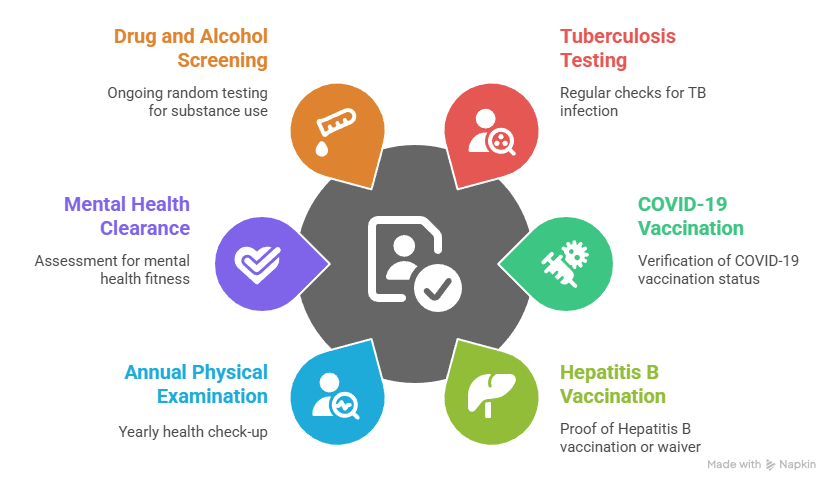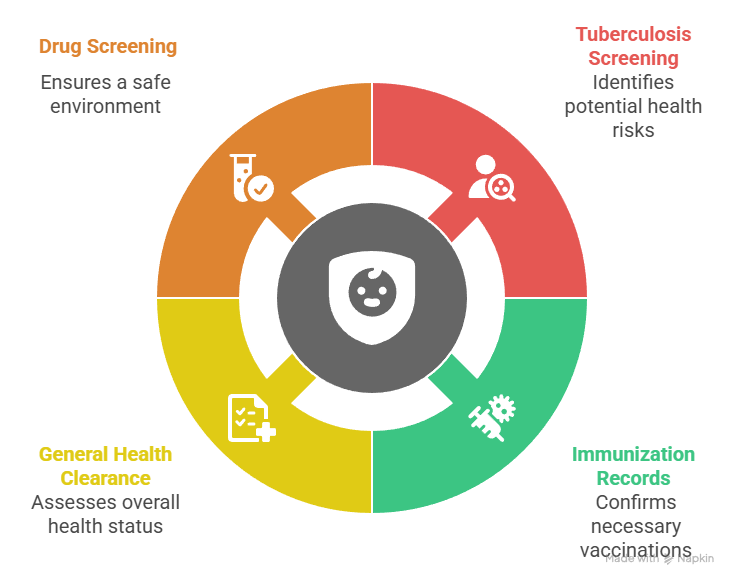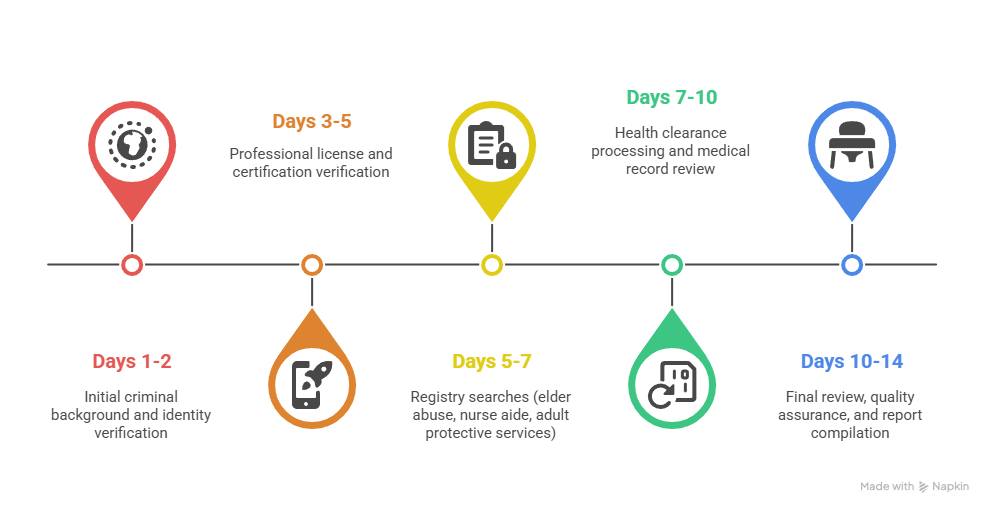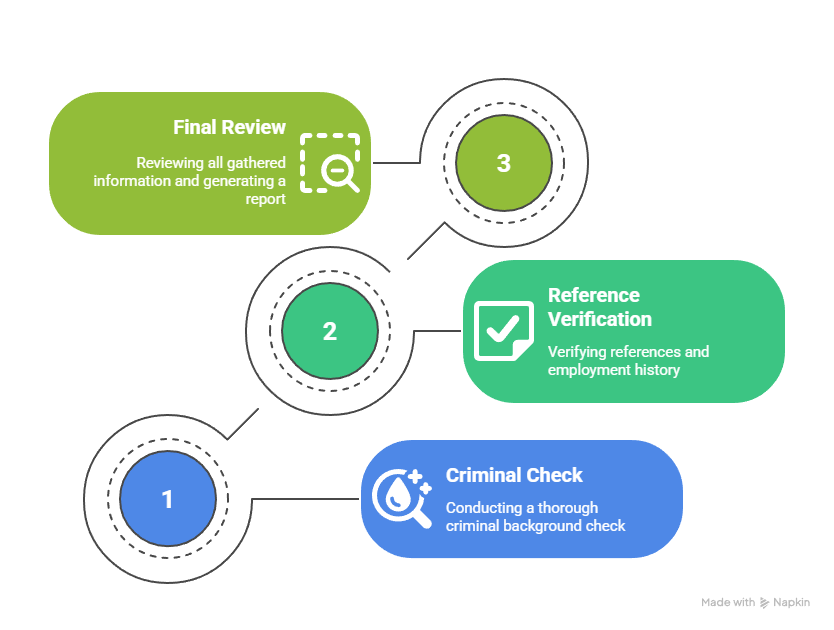Elderly caregiver background checks typically require more comprehensive screening than childcare workers, including additional health clearances, abuse registry searches, and specialized training verifications due to the vulnerable nature of senior populations. While both sectors mandate criminal history reviews and reference checks, senior care background screening often involves stricter requirements for financial crimes, healthcare fraud, and elder abuse prevention measures.
Key Takeaways
- Elderly caregiver background checks include specialized elder abuse registry searches that aren't required for childcare positions
- Senior care providers must often pass additional health screenings, including tuberculosis tests and COVID-19 vaccinations
- Financial background checks are more stringent for elder care due to increased risk of financial exploitation of seniors
- Both sectors require criminal background checks, but elderly care screening covers longer lookback periods for certain offenses
- Professional licensing verification is mandatory for many senior care roles, while childcare positions may only require basic certifications
- Reference checks for elder care positions typically require healthcare or senior care experience verification, unlike general childcare references
Understanding Background Check Requirements by Care Sector
The landscape of background screening varies significantly between elderly and childcare sectors, reflecting the unique vulnerabilities and regulatory frameworks governing each field. Senior care background screening has evolved to address the specific risks associated with caring for older adults, including cognitive impairment, physical frailty, and financial vulnerability. Childcare background checks, while comprehensive, focus primarily on child safety and developmental appropriateness.
Federal and state regulations create distinct compliance requirements for each sector. The Fair Credit Reporting Act (FCRA) applies to both industries, but additional layers of protection exist specifically for elder care through the Older Americans Act and various state-specific elder protection statutes. These regulatory differences directly impact the depth and scope of required background investigations.
Understanding these distinctions helps families, agencies, and job seekers navigate the hiring process more effectively. Employers must ensure compliance with sector-specific requirements while candidates can better prepare for the screening process by knowing what to expect in their chosen field.
Federal Regulatory Framework Differences
The regulatory environment for elderly caregiver background checks operates under multiple federal oversight bodies, including the Centers for Medicare & Medicaid Services (CMS) and the Department of Health and Human Services. These agencies mandate specific screening protocols for facilities receiving federal funding, creating standardized requirements across participating providers.
Childcare regulations primarily fall under the Department of Health and Human Services through the Child Care and Development Block Grant Act, which establishes baseline screening requirements. However, the implementation and specific requirements often vary more widely between states compared to elder care standards.
Criminal Background Check Scope and Depth
Criminal history screening represents the foundation of both elderly and childcare background investigations, but the scope and interpretation of results differ significantly between sectors. Elder care positions typically require more extensive criminal background reviews, including federal database searches, multi-state criminal history checks, and specialized searches for healthcare-related offenses. The screening process often extends beyond standard criminal databases to include professional sanctions, healthcare fraud databases, and civil court records.
| Background Check Component | Elder Care Requirements | Childcare Requirements |
| Criminal History Lookback Period | 7-10 years (varies by state) | 5-7 years (varies by state) |
| Federal Database Search | Required for most positions | Required for licensed facilities |
| Multi-State Search | Mandatory for licensed roles | Often optional |
| Healthcare Fraud Database | Required | Not applicable |
The interpretation of criminal findings also varies between sectors. Elder care employers typically maintain stricter policies regarding financial crimes, fraud, and any history of abuse or exploitation offenses. Property crimes and financial offenses that might not disqualify childcare candidates could prevent employment in senior care settings due to the increased vulnerability of elderly clients.
Disqualifying Offenses by Sector
Elder care facilities maintain comprehensive lists of automatically disqualifying offenses that often exceed those required for childcare positions. Financial crimes, identity theft, and fraud offenses receive particular scrutiny due to the increased risk of financial exploitation in senior populations.
Violence-related offenses typically disqualify candidates in both sectors, but elder care screening may include additional categories such as neglect, abandonment, or exploitation charges. The presence of any elder abuse-related offense creates permanent disqualification in most jurisdictions, regardless of the time elapsed since the incident.
Appeal and Review Processes
Both sectors provide mechanisms for candidates to dispute background check results, but elder care often maintains more restrictive appeal processes. The higher vulnerability of the client population creates additional hurdles for overturning adverse decisions, particularly for offenses related to abuse, neglect, or financial crimes.
Health and Safety Screening Requirements
Health clearances represent a critical component of senior care background screening that often exceeds childcare requirements in scope and frequency. Elderly caregiver background checks typically mandate comprehensive health evaluations, including tuberculosis screening, immunization records, and physical fitness assessments. Many states require annual health updates for elder care workers, while childcare providers may only need initial clearances.
The COVID-19 pandemic has intensified health screening requirements across both sectors, but elder care maintains more stringent ongoing monitoring protocols. Vaccination requirements, regular health screenings, and infectious disease protocols have become standard components of the background verification process for senior care positions.
Required Health Screenings for Elder Care:

- Tuberculosis testing (annual or biennial)
- COVID-19 vaccination verification
- Hepatitis B vaccination or waiver
- Annual physical examination
- Mental health clearance for certain positions
- Drug and alcohol screening (ongoing random testing)
Standard Childcare Health Requirements:

- Initial tuberculosis screening
- Basic immunization records
- General health clearance
- Drug screening (initial only)
These enhanced health requirements reflect the increased medical vulnerability of elderly populations and the higher risk of serious complications from infectious diseases. The ongoing nature of health monitoring in elder care also creates additional administrative burden and compliance requirements for both employers and employees.
Professional Licensing and Certification Verification
The verification of professional credentials represents a major distinction between elderly caregiver background checks and childcare screening processes. Senior care positions frequently require specialized licensing, certifications, and ongoing education that must be verified and monitored throughout employment. Licensed practical nurses, certified nursing assistants, and home health aides must maintain active licenses and complete continuing education requirements that become part of the ongoing background verification process.
Childcare positions, while requiring certain certifications like CPR and first aid, typically involve less complex licensing verification. Early childhood education credentials, while important, don't carry the same regulatory oversight and renewal requirements as healthcare-related licenses common in elder care settings.
Professional licensing verification for elder care extends beyond basic credential confirmation to include disciplinary actions, sanctions, and restrictions placed on licenses by regulatory boards. State nursing boards, medical boards, and healthcare licensing authorities maintain public databases of disciplinary actions that employers must review as part of the screening process. This level of professional oversight rarely exists in childcare settings.
| Professional Verification Component | Elder Care | Childcare |
| Active License Verification | Required for most direct care roles | Limited to specialized positions |
| Disciplinary Action Review | Mandatory database searches | Basic verification only |
| Continuing Education Confirmation | Ongoing monitoring required | Initial verification |
| Professional Reference Requirements | Healthcare/elder care specific | General childcare experience |
The complexity of professional verification in elder care creates additional time and cost factors in the background screening process. Employers must establish systems for ongoing monitoring of license status, renewal dates, and any disciplinary actions that may occur during employment.
Specialized Certification Requirements
Elder care positions often require specialized certifications that go beyond basic healthcare training, including dementia care certifications, medication administration training, and specialized equipment operation credentials. These certifications must be verified initially and monitored for renewal throughout employment.
The verification process involves confirming not only the existence of certifications but also their current status, any restrictions or conditions, and compliance with continuing education requirements. This creates an ongoing administrative burden that's typically absent in childcare screening processes.
Abuse Registry and Vulnerable Population Database Searches
Senior care background screening includes mandatory searches of elder abuse registries and vulnerable adult protection databases that don't exist in childcare screening protocols. These specialized databases track individuals who have been substantiated for abuse, neglect, or exploitation of elderly or vulnerable adult populations. The searches extend beyond criminal convictions to include civil findings, administrative actions, and protective service investigations.
The scope of vulnerable population database searches in elder care encompasses multiple registry types. State elder abuse registries maintain records of substantiated abuse cases, while nurse aide registries track disciplinary actions and neglect findings specific to certified nursing assistants. Adult protective services databases may contain additional information about individuals who have been investigated for vulnerable adult abuse or neglect.
Elder Care Registry Searches Include:
- State Elder Abuse Registry: Substantiated abuse and neglect cases involving elderly victims
- Nurse Aide Registry: Disciplinary actions, neglect findings, and training compliance for CNAs
- Adult Protective Services Database: Investigation records for vulnerable adult abuse or exploitation
- Healthcare Worker Registry: Sanctions and restrictions on healthcare worker certifications
Childcare Registry Searches Focus On:
- Child Abuse Registry: Substantiated cases involving minor victims
- Sex Offender Registry: Geographic restrictions and notification requirements
The interpretation of registry findings differs significantly between sectors. Elder care employers typically maintain zero-tolerance policies for any substantiated findings in vulnerable population databases, while childcare screening may allow for individual assessment of circumstances and time elapsed since incidents.
These database searches often require separate authorization and consent from candidates, as they may contain information not captured in traditional criminal background checks. The administrative complexity of conducting multiple registry searches adds time and cost to the elder care screening process.
Interstate Registry Verification
Elder care workers who have lived or worked in multiple states require registry searches across all relevant jurisdictions, creating complex multi-state verification processes. Unlike criminal background checks, registry databases don't always communicate across state lines, requiring individual searches in each jurisdiction.
The portability of professional licenses in healthcare creates additional complexity, as disciplinary actions in one state may affect licensing eligibility in another. This interconnected nature of healthcare regulation requires more comprehensive interstate verification than typically needed for childcare positions.
Financial Background Screening Differences
Financial background verification represents a critical component of elderly caregiver background checks that receives minimal attention in childcare screening. The increased vulnerability of elderly populations to financial exploitation and fraud drives enhanced scrutiny of candidates' financial history, credit records, and any past involvement in financial crimes or civil judgments.
Senior care background screening often includes credit report reviews, bankruptcy filings, and civil court judgment searches. Employers evaluate financial stress indicators that might increase the risk of theft or exploitation of elderly clients who may have significant assets, disability payments, or limited oversight of their financial affairs. These financial background components rarely factor into childcare hiring decisions unless the position involves handling facility finances.
The review extends beyond basic credit information to examine patterns of financial irresponsibility, recent financial distress, or involvement in debt collection actions. While federal and state fair credit reporting laws limit how financial information can be used in employment decisions, elder care positions often qualify for enhanced financial screening due to the fiduciary responsibilities involved in caring for vulnerable adults.
Civil court records receive particular attention in elder care screening, as financial disputes, consumer fraud cases, or civil judgments may indicate patterns of behavior concerning in a senior care environment. The screening may also include verification of employment history gaps that could indicate unreported financial difficulties or employment terminations related to financial misconduct.
This financial screening component adds significant complexity to the background verification process and requires employers to maintain compliance with FCRA requirements, state credit reporting restrictions, and equal employment opportunity guidelines while still protecting vulnerable elderly clients from financial exploitation.
Timeline and Processing Differences
The complexity of senior care background screening creates significantly longer processing timelines compared to standard childcare background checks. While basic childcare screening may be completed within 3-5 business days, elderly caregiver background checks often require 7-14 days due to the multiple database searches, registry verifications, and professional license confirmations required.
Processing delays frequently occur during professional license verification, as state licensing boards may take several days to respond to verification requests. Healthcare licensing databases may be updated less frequently than criminal record systems, potentially requiring additional follow-up to confirm current license status and any recent disciplinary actions.
Typical Processing Timeline Comparison:
Elder Care Background Screening (7-14 days):

- Days 1-2: Initial criminal background and identity verification
- Days 3-5: Professional license and certification verification
- Days 5-7: Registry searches (elder abuse, nurse aide, adult protective services)
- Days 7-10: Health clearance processing and medical record review
- Days 10-14: Final review, quality assurance, and report compilation
Childcare Background Screening (3-5 days):

- Days 1-2: Criminal background check and child abuse registry search
- Days 2-3: Reference verification and employment history confirmation
- Days 3-5: Final review and report generation
The extended timeline for elder care screening requires careful planning by employers to avoid delays in staffing. Many senior care facilities maintain ongoing recruitment pipelines to account for the longer verification periods, while childcare centers may be able to make more immediate hiring decisions.
Rush processing options exist for both sectors but may compromise the thoroughness of the screening or incur significant additional costs. Emergency hiring situations in elder care often require temporary supervision or restricted duties until full background verification is completed.
Expedited Screening Options
Some elder care employers utilize phased screening approaches, conducting initial criminal and registry searches within 48-72 hours to allow conditional hiring while comprehensive professional verification continues. This approach requires careful risk management and ongoing supervision until full clearance is obtained.
Technology platforms are increasingly offering real-time verification for certain components of elder care screening, particularly criminal background checks and some professional license verifications. However, registry searches and health clearances continue to require traditional processing timelines due to the nature of the underlying databases and verification systems.
Cost Implications and Budget Considerations
The comprehensive nature of elderly caregiver background checks creates substantially higher costs compared to standard childcare screening. While basic childcare background verification may cost $25-50 per candidate, senior care background screening typically ranges from $75-150 due to the multiple database searches, professional verifications, and specialized registry access required.
The cost structure reflects the complexity of information sources accessed during elder care screening. Professional license verification, healthcare database searches, and specialized registry access often involve individual fees that accumulate throughout the process. Multi-state searches, common for healthcare workers with portable licenses, can further increase costs through additional jurisdiction fees.
Cost Breakdown Comparison:
Elder Care Background Screening ($75-150):
- Criminal background check: $15-25
- Professional license verification: $20-30
- Elder abuse and vulnerable adult registry searches: $15-25
- Health clearance processing: $10-20
- Credit and financial screening: $10-15
- Administrative and report generation: $5-15
Childcare Background Screening ($25-50):
- Criminal background check: $10-20
- Child abuse registry search: $5-10
- Reference verification: $5-10
- Administrative and report generation: $5-10
Volume pricing and comprehensive screening packages can reduce per-unit costs for larger employers, but the baseline expense remains significantly higher for elder care positions. The investment reflects the enhanced due diligence required to protect vulnerable elderly populations and maintain compliance with sector-specific regulations.
Annual re-screening requirements common in elder care create ongoing costs that must be factored into employment budgets. While childcare positions may only require initial screening with limited updates, elder care workers often undergo annual or biennial re-verification of licenses, registries, and health clearances.
Conclusion
Understanding the differences between elderly caregiver background checks and childcare screening is essential for employers, job seekers, and families making care decisions. Senior care background screening involves more comprehensive verification processes, including specialized registry searches, enhanced financial screening, and ongoing professional license monitoring that reflect the unique vulnerabilities of elderly populations. While these requirements create longer timelines and higher costs, they provide essential protections for some of society's most vulnerable members. Whether you're hiring a caregiver, seeking employment in senior care, or choosing between care options, recognizing these screening differences helps ensure appropriate safety measures while maintaining realistic expectations about the verification process. The investment in thorough background screening ultimately protects both care recipients and care providers by establishing clear standards and accountability in these critical care relationships.
Frequently Asked Questions
What makes elderly caregiver background checks more extensive than childcare screening?
Elderly caregiver background checks include additional components like elder abuse registry searches, financial background screening, and comprehensive health clearances that reflect the increased vulnerability of senior populations to financial exploitation, abuse, and infectious diseases.
How long do senior care background checks typically take to complete?
Senior care background screening usually requires 7-14 business days due to multiple database searches, professional license verification, and registry checks, compared to 3-5 days for standard childcare background verification.
Are elder abuse registry searches required for all senior care positions?
Most states require elder abuse registry searches for direct care positions in senior care facilities, home health agencies, and adult day programs, though specific requirements vary by state and position type.
What types of criminal offenses automatically disqualify elder care candidates?
Elder abuse, financial crimes, fraud, identity theft, and exploitation offenses typically create automatic disqualification for elder care positions, with many facilities maintaining stricter policies than those required for childcare roles.
Do elder care workers need ongoing background check updates?
Yes, many elder care positions require annual or biennial re-screening of criminal records, professional licenses, and registry databases, along with ongoing health clearance updates, creating ongoing compliance requirements.
How do professional licensing requirements differ between elder care and childcare?
Elder care positions frequently require healthcare-specific licenses (CNA, LPN, HHA) with ongoing verification of disciplinary actions and continuing education, while childcare positions typically involve less complex certification requirements with basic initial verification only.
Additional Resources
- Fair Credit Reporting Act (FCRA) Compliance Guide for Healthcare Employers
https://www.ftc.gov/business-guidance/resources/using-consumer-reports-what-employers-need-know - Centers for Medicare & Medicaid Services Background Check Requirements
https://www.cms.gov/medicare/provider-enrollment-and-certification/guidanceforlawsandregulations/background-checks - National Adult Protective Services Association Resource Center
https://www.napsa-now.org/policy-advocacy/adult-protective-services-laws/ - State Elder Abuse Registry Directory and Access Information
https://ncea.acl.gov/Resources/State-Resources.aspx - Healthcare Background Screening Best Practices and Compliance Guidelines
https://www.napbs.com/about-screening/background-screening-101 - EEOC Guidance on Background Checks and Employment Discrimination
https://www.eeoc.gov/laws/guidance/background-checks-what-employers-need-know
Still have questions?
Get in touch with our team today for a personalized demo and discover how our tailored volume pricing and packages can drive results for your business!
How useful was this page?*
Note: your comments are anonymous. We use them to improve the website. Do not include any personal details.
Visit our FCRA Compliance Tool or leave a message here if you need a response.
From the blog Explore the GCheck Content Hub

How Long Does a Background Check Take? A Complete 2025 Guide
13 Dec, 2023 • 14 min read
The Ultimate Background Check Guide
13 Dec, 2023 • 4 min read
The Ultimate Guide to Employment Background Checks
13 Dec, 2023 • 10 min readThe information provided in this article is for general informational and educational purposes only and should not be construed as legal advice or a substitute for consultation with qualified legal counsel. While we strive to ensure accuracy, employment screening laws and regulations—including but not limited to the Fair Credit Reporting Act (FCRA), Equal Employment Opportunity Commission (EEOC) guidelines, state and local ban-the-box laws, industry-specific requirements, and other applicable federal, state, and local statutes—are subject to frequent changes, varying interpretations, and jurisdiction-specific applications that may affect their implementation in your organization. Employers and screening decision-makers are solely responsible for ensuring their background check policies, procedures, and practices comply with all applicable laws and regulations relevant to their specific industry, location, and circumstances. We strongly recommend consulting with qualified employment law attorneys and compliance professionals before making hiring, tenant screening, or other decisions based on background check information.

